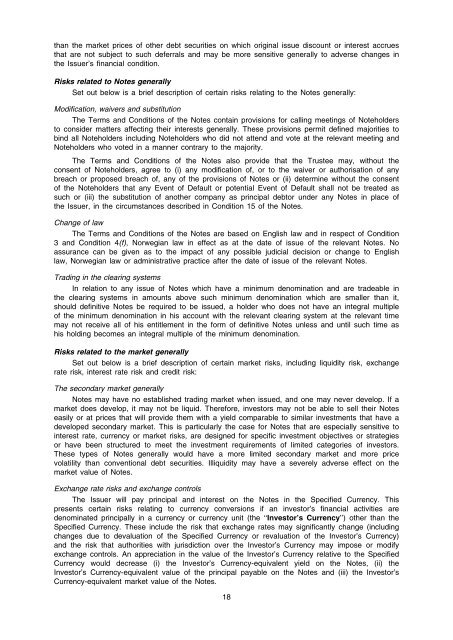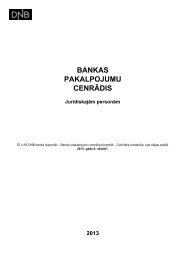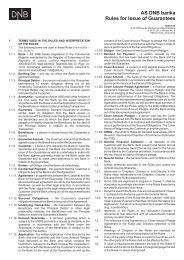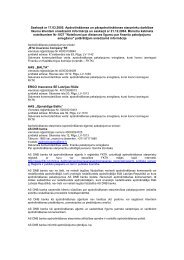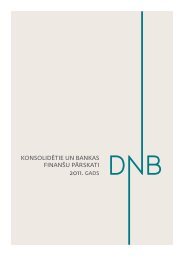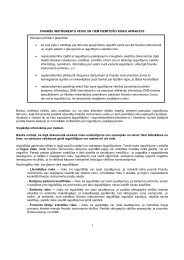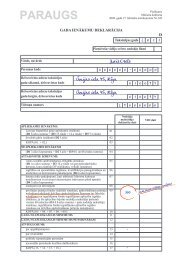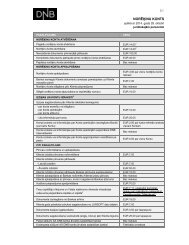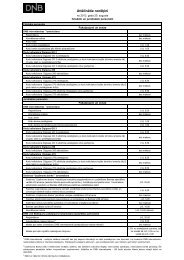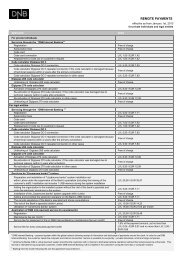Base Prospectus - Malta Financial Services Authority
Base Prospectus - Malta Financial Services Authority
Base Prospectus - Malta Financial Services Authority
Create successful ePaper yourself
Turn your PDF publications into a flip-book with our unique Google optimized e-Paper software.
than the market prices of other debt securities on which original issue discount or interest accrues<br />
that are not subject to such deferrals and may be more sensitive generally to adverse changes in<br />
the Issuer’s financial condition.<br />
Risks related to Notes generally<br />
Set out below is a brief description of certain risks relating to the Notes generally:<br />
Modification, waivers and substitution<br />
The Terms and Conditions of the Notes contain provisions for calling meetings of Noteholders<br />
to consider matters affecting their interests generally. These provisions permit defined majorities to<br />
bind all Noteholders including Noteholders who did not attend and vote at the relevant meeting and<br />
Noteholders who voted in a manner contrary to the majority.<br />
The Terms and Conditions of the Notes also provide that the Trustee may, without the<br />
consent of Noteholders, agree to (i) any modification of, or to the waiver or authorisation of any<br />
breach or proposed breach of, any of the provisions of Notes or (ii) determine without the consent<br />
of the Noteholders that any Event of Default or potential Event of Default shall not be treated as<br />
such or (iii) the substitution of another company as principal debtor under any Notes in place of<br />
the Issuer, in the circumstances described in Condition 15 of the Notes.<br />
Change of law<br />
The Terms and Conditions of the Notes are based on English law and in respect of Condition<br />
3 and Condition 4(f), Norwegian law in effect as at the date of issue of the relevant Notes. No<br />
assurance can be given as to the impact of any possible judicial decision or change to English<br />
law, Norwegian law or administrative practice after the date of issue of the relevant Notes.<br />
Trading in the clearing systems<br />
In relation to any issue of Notes which have a minimum denomination and are tradeable in<br />
the clearing systems in amounts above such minimum denomination which are smaller than it,<br />
should definitive Notes be required to be issued, a holder who does not have an integral multiple<br />
of the minimum denomination in his account with the relevant clearing system at the relevant time<br />
may not receive all of his entitlement in the form of definitive Notes unless and until such time as<br />
his holding becomes an integral multiple of the minimum denomination.<br />
Risks related to the market generally<br />
Set out below is a brief description of certain market risks, including liquidity risk, exchange<br />
rate risk, interest rate risk and credit risk:<br />
The secondary market generally<br />
Notes may have no established trading market when issued, and one may never develop. If a<br />
market does develop, it may not be liquid. Therefore, investors may not be able to sell their Notes<br />
easily or at prices that will provide them with a yield comparable to similar investments that have a<br />
developed secondary market. This is particularly the case for Notes that are especially sensitive to<br />
interest rate, currency or market risks, are designed for specific investment objectives or strategies<br />
or have been structured to meet the investment requirements of limited categories of investors.<br />
These types of Notes generally would have a more limited secondary market and more price<br />
volatility than conventional debt securities. Illiquidity may have a severely adverse effect on the<br />
market value of Notes.<br />
Exchange rate risks and exchange controls<br />
The Issuer will pay principal and interest on the Notes in the Specified Currency. This<br />
presents certain risks relating to currency conversions if an investor’s financial activities are<br />
denominated principally in a currency or currency unit (the ‘‘Investor’s Currency’’) other than the<br />
Specified Currency. These include the risk that exchange rates may significantly change (including<br />
changes due to devaluation of the Specified Currency or revaluation of the Investor’s Currency)<br />
and the risk that authorities with jurisdiction over the Investor’s Currency may impose or modify<br />
exchange controls. An appreciation in the value of the Investor’s Currency relative to the Specified<br />
Currency would decrease (i) the Investor’s Currency-equivalent yield on the Notes, (ii) the<br />
Investor’s Currency-equivalent value of the principal payable on the Notes and (iii) the Investor’s<br />
Currency-equivalent market value of the Notes.<br />
18


